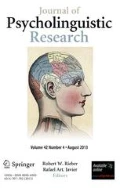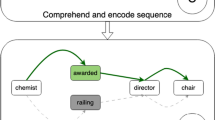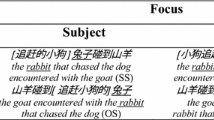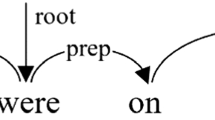Abstract
Two experiments were carried out to examine the ability of elderly subjects to establish syntactically governed dependency relations during the course of sentence comprehension. The findings reveal the manner in which memory constraints operate during syntactic processing.
Similar content being viewed by others
References
Chomsky, N. (1981).Lectures on government and binding. Dordrecht: Foris.
Clements, G., McCloskey, J., Maling, J., & Zaenen, A. (1983). String-vacuous rule application.Linguistic Inquiry, 14, 1–17.
Corbett, A. T., & Dosher, B. A. (1978). Instrument inferences in sentence encoding.Journal of Verbal Learning and Verbal Behavior, 17, 479–491.
Cutler, A., & Swinney, D. (1978). The processing of presuppositions during sentence comprehension.Tufts University Papers in Cognitive Science, 7.
Emery, O. B. (1985). Language and aging.Experimental Aging Research 11, 3–60.
Feier, C. D. & Gerstman, L. (1980). Sentence comprehension abilities throughout the adult life span.Journal of Gerontology, 35, 722–728.
Fodor, J. A. (1983).Modularity of mind. Cambridge, MA: MIT Press.
Fodor, J. D. (1989). Empty categories in sentence processing.Language and Cognitive Processes, 4, 155–209.
Forster, K. (1990). Lexical processing. In D. Osherson & H. Lasnik (Eds.),An invitation to cognitive science: Language (Vol. 1). Cambridge, MA: MIT Press.
Francis, W., & Kucera, H. (1982).Frequency analysis of English usage: Lexicon and grammar. Boston: Houghton Mifflin.
Frauenfelder, U., & Tyler, L. (1987). The process of spoken word recognition.Cognition.25, 1–20.
Garnsey, S., Tanenhaus, M., & Chapman, R. (1989). Evoked potentials and the study of sentence comprehension.Journal of Psycholinguistic Research, 18, 51–60.
Hasher, L., & Zacks, R. T. (1988). Working memory, comprehension, and aging: A review and a new view. In G. Bower (Ed.),The psychology of learning and motivation (Vol. 22). New York: Academic Press.
Hickok, G., Canseco-Gonzalez, E., Zurif, E., & Grimshaw, J. (1992). Modularity in locating wh-gaps.Journal of Psycholinguistic Research, 21, 545–561.
Jenkins, J. J. (1970). The 1952 Minnesota word association norms. In L. Postman & G. Keppel (Eds.),Norms of word associations. New York: Academic Press.
Kemper, S. (1986). Imitation of complex syntactic constructions by elderly adults.Applied Psycholinguistics, 7, 277–288.
Kemper, S. (1988). Geriatric psycholinguistics. In L. L. Light & D. M. Burke (Eds.),Language, memory, and aging. New York: Cambridge University Press.
Keppel, G., & Strand, B. Z. (1970). Free-association responses to the primary responses and other responses selected from the Palermo-Jenkins norms. In L. Postman & G. Keppel (Eds.),Norms of word associations. New York: Academic Press.
Light, L. L. (1990). Interactions between memory and language in old age. In J. E. Birren (Ed.),Handbook of the psychology of aging (3rd ed.). San Diego: Academic Press.
Light, L., & Capps, J. (1986). Comprehension of pronouns in younger and older adults.Developmental Psychology, 22, 580–585.
McElree, B. & Bever, T. (1989). The psychological reality of linguistically defined gaps.Journal of Psycholinguistic Research, 18, 21–36.
Meyer, D., Schvaneveldt, R., & Ruddy, M. (1975). Loci of contextual effects on visual word recognition. In P. Rabbit & S. Dornic (Eds.).Attention and performance (Vol. 1). New York: Academic Press.
Monsell, S. (1985). Repetition and the lexicon. In A. W. Ellis (Ed.),Progress in the psychology of language. London: LEA.
Nicol, J., & Swinney, D. (1989). The role of structure in coreference assignment during sentence comprehension.Journal of Psycholinguistic Research, 18, 5–20.
Norman, S., Kemper, S., Kynette, D., Cheung, H. & Anagnopoulus, C. (1991). Syntactic complexity and adults' running memory span.Journal of Gerontology: Psychological Sciences, 46, 346–351.
Postman, L. (1970). The California norms: Association as a function of word frequency. In L. Postman & G. Keppel (Eds.)Norms of word associations. New York: Academic Press.
Stine, E. A. L. & Wingfield, A. (1990). How much do working memory deficits contribute to age differences in discourse memory?European Journal of Cognitive Psychology 2, 289–304.
Swinney, D. (1991). The resolution of indeterminacy during language comprehension: Perspectives on modularity in lexical, structural, and pragmatic processing. In G. Simpson (Ed.),Understanding word and sentence. Amsterdam: Elsevier.
Swinney, D., & Fodor, J. D. (Eds.). (1989). Sentence processing [Special issue].Journal of Psycholinguistic Research.18 (1).
Swinney, D., & Fodor, J. D. (Eds.) (1991). Sentence processing [Special issue].Journal of Psycholinguistic Research.20 (3).
Swinney, D., & Fodor, J. D. (Eds.). (1993). Sentence processing [Special issue].Journal of Psycholinguistic Research.22 (2).
Swinney, D., Ford, M., Frauenfelder, U., & Bresnan, J. (1988).On the temporal course of gap-filling and antecedent assignment during sentence comprehension. Unpublished manuscript, Psychology Department, University of California, San Diego.
Swinney, D., & Osterhout, L. (1990). Inference generation during auditory language comprehension. In A. C. Graesser & G. H. Bower (Eds.).Inferences and text comprehension. San Diego: Academic Press.
Wingfield, A., Stine, E. A. L., Lahar, C. J., & Aberdeen, J. S. (1988). Does the capacity of working memory change with age?Experimental Aging Research.14, 103–107.
Author information
Authors and Affiliations
Additional information
The writing of the manuscript and the research reported in it were primarily supported by NIH grant AG10496. Support was also obtained from grants DC00081, NS27894, AFOSR91-225, and AG04517 and from the Research Service of The Department of Veterans Affairs. We are very grateful to Tracy Love, Catherine Stern, Margaret O'Grady, and Merri Rosen for their help.
Rights and permissions
About this article
Cite this article
Zurif, E., Swinney, D., Prather, P. et al. The allocation of memory resources during sentence comprehension: Evidence from the elderly. J Psycholinguist Res 24, 165–182 (1995). https://doi.org/10.1007/BF02145354
Accepted:
Issue Date:
DOI: https://doi.org/10.1007/BF02145354




